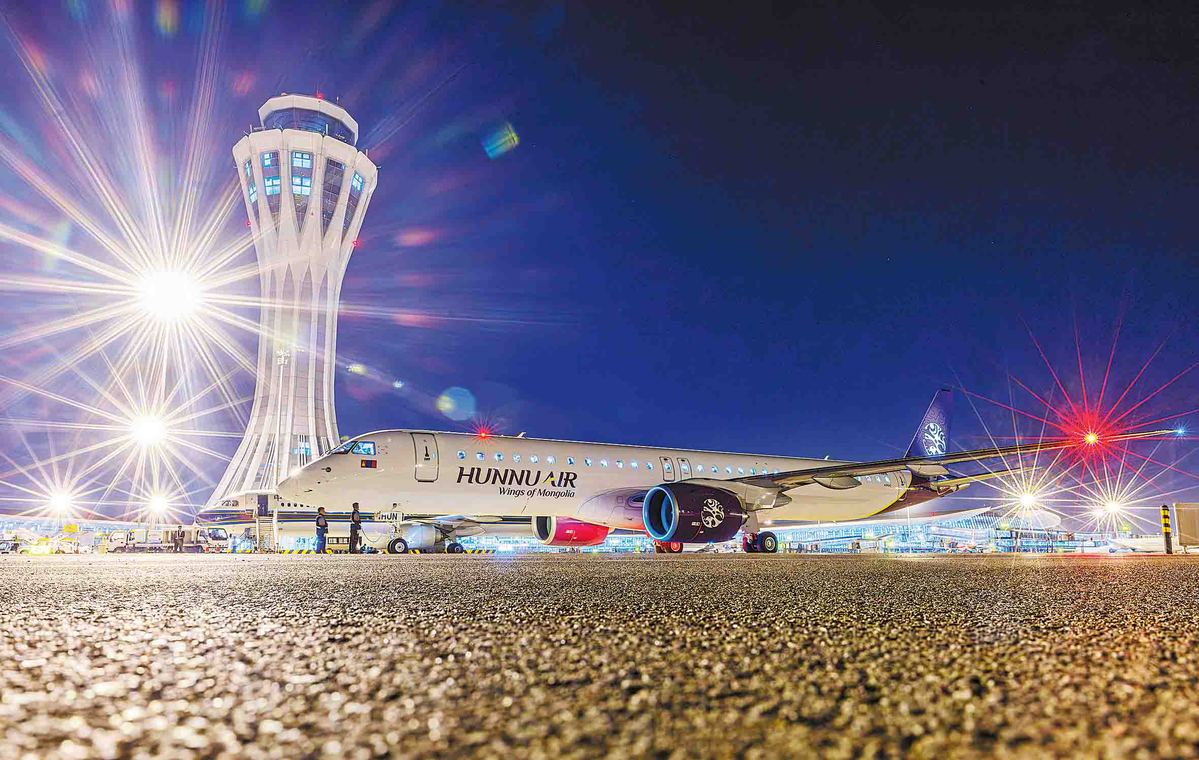Hunnu Air to increase E195-E2 flights to Beijing


Eyeing the rapidly growing aviation market in China to further drive its growth, Brazilian aircraft manufacturer Embraer SA said that "In China, for China" stands as its guiding principle and a natural outcome of its 25-year sustained commitment to the Chinese market.
The company said that it has learned that the deeper it embeds itself "in" China, the more precisely it can deliver "for" China.
One of its customers, Mongolian carrier Hunnu Air, plans to increase round-trip services using Embraer E195-E2 aircraft between Ulan Bator and Beijing Daxing International Airport to a daily flight from June 1.
The airline has operated the round-trip service using the E195-E2 since April 30, and currently offers four return flights per week. The flight is being operated by the first of two new E195-E2 aircraft delivered to Hunnu Air in April, and also marked the first operation of an E195-E2 aircraft model on a scheduled route to and from the Chinese mainland.
Since late 2023, the airline has operated the route with Embraer E190-E1 aircraft, a smaller model. The upgrade to larger aircraft shows the strengthening of connectivity between the aviation hubs of Mongolia and China, and highlights the fact that the two countries aim to foster closer economic and cultural ties, said Hunnu Air.
The carrier said it also plans to use the E195-E2 aircraft to increase capacity to Chinese cities such as Haikou and Sanya in Hainan province, and expand services to countries like Japan, Vietnam, India and South Korea.
The carrier's E195-E2 aircraft is configured in a dual-class layout with 136 seats in a 2-2 layout.
"The launch of this route with our new aircraft reflects Hunnu Air's determination to expand our international network and symbolizes the deepening friendship and collaboration between Mongolia and China in this new era," said Munkhjargal Purevjal, CEO of Hunnu Air.
"The introduction of the E195-E2 serves as an upgrade to meet growing domestic and international travel demand. We expect that the E2 will become a backbone of our long-term growth," he said.
Martyn Holmes, chief commercial officer of Embraer Commercial Aviation, said the right-sized E2 would enable Hunnu Air to profitably grow, unlocking the huge potential of Mongolia and strengthening a growing network in Asia.
Currently, Embraer has around 80 E-Jets flying in China, operated by domestic carriers. Its E190-E2 and E195-E2 aircraft models have both received their type certifications in the country, which opens the door to more operators.
The Brazilian aircraft manufacturer said it has been consistent in strengthening industrial cooperation with China, and working with China's highly capable aerospace supply chain. Only by being truly rooted in this market, understanding the demand of Chinese customers and fully leveraging the advantages such as the country's robust supply chain ecosystem, can it achieve enduring success in this fiercely competitive market.
The company estimates that over the next 20 years, China will require more than 1,400 small and medium-sized narrow-body aircraft with up to 150 seats each.
Meanwhile, the International Air Transport Association recently released data for global passenger demand for air travel in March. Total demand, measured in revenue passenger kilometers, was up 3.3 percent compared to March 2024. Total capacity, measured in available seat kilometers, grew by 5.3 percent year-on-year.
"There remains a lot of speculation around the potential impact of tariffs and other economic headwinds on travel. While the small decline in demand in North America needs to be watched carefully, March numbers continued to show a global pattern of growth for air travel," said Willie Walsh, IATA's director general.



































